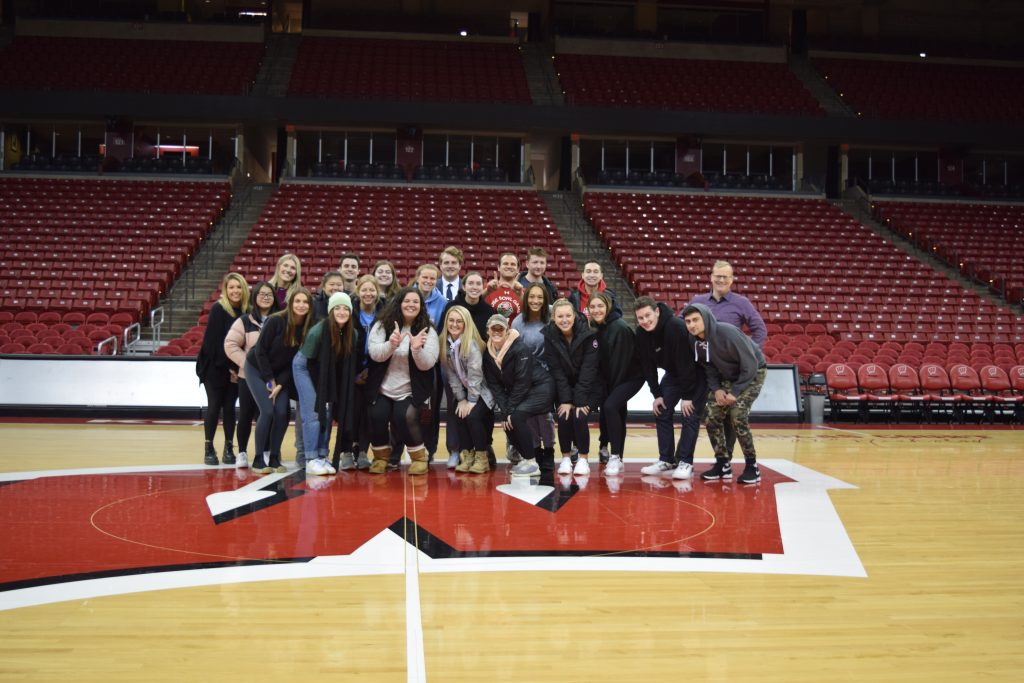
By Emily Knepple
Last fall, the UW-Madison School of Journalism and Mass Communication launched the Certificate in Sports Communication (CSC) to help bridge a gap between interested students and the sports industry.
The CSC is a 12-credit program open to all undergraduate students at UW. With courses covering a wide range of topics, the program has seen rising interest and currently has about 110 students enrolled.
Matt Hermann, Associate Faculty Associate and advisor for the CSC joined the SJMC last fall. He currently teaches J560: Sports Marketing Communications. The conversation regarding the certificate was well underway when Hermann had arrived but he was excited to offer his expertise and get involved in this new development.
He shares there was an expressed interest in sports within the J-School. “We wanted to give [students] a way to focus their learning on the field that they were hoping to join,” Hermann said.
Due to the popularity of the sports industry as a whole, those involved in the certificate saw an opportunity for interdisciplinary learning.
“The department was pretty insistent on the idea that this would be a certificate that would be pursued by non J-School students as well,” Hermann shared. The CSC is a chance for students who might not have otherwise crossed paths to find common ground.
Another benefit of the certificate Hermann points out is the exposure to the industry. With courses that cover many different aspects of sports as a whole, the certificate gives students a chance to learn skills that will help them after college. Those involved in the certificate noticed this early on.
“Having a certificate that can actually give people a chance to earn a credential that not only gives them skills but also something they can use to market themselves in the future seemed like a great idea,” Hermann said.
Brandon Storlie, a current J-School Ph.D. student and instructor of two courses within the certificate furthers this idea. With a background in sports writing, he shares that most of his knowledge about sports writing came from experience outside of the J-School.
Storlie says that “students are getting actual sports-oriented experience, which is sort of a hard thing to come by.”
Storlie currently teaches J150: Introduction to Sports Communication and J651: Sports Controversies and Communication Professionals. The CSC offers an extra element of understanding in today’s world that can lead to productive conversations.
“There are various controversies having to do with things like gender and sexual orientation in the realm of sports. Those are topics that we need to talk about because not only are they relevant to the sports world, but obviously they overlap into larger discussions we need to have as a society,” Storlie shares.
For students like Kelsey Tehan, the CSC bridged a gap between the tools the J-School has taught her and a specific interest that she has: sports. As the president of the Association of Women in Sports Media, Tehan already works with students looking for exposure to the industry; the certificate helps her better understand how to be an effective sports communicator.
“For me, it was kind of a no-brainer. This is what I want to do, the only thing it’s going to do is help me,” shared Tehan. The professors in the program have also played a huge role for her in the program. With real-life experience and a willingness to help prepare students, those teaching within the program offer their expertise to help students engage with sports communication as a whole.
Tehan added the certificate allows her to hear from and work with students outside of the J-School, which proves to be rewarding.
“There’s a really good balance of those in the J-School and those that aren’t,” said Tehan. “It makes the classes that much more interesting because you’re getting discussions from all different kinds of students with different perspectives on sports communication.”
In the midst of a turbulent semester, COVID-19 has turned the majority of the courses for the CSC online. However, Storlie shares that J150 was already set-up remotely as it has been taught as a summer course. While he acknowledges that for students the reality of going to college during a pandemic has stayed the same, the course itself was already specialized and ready to go.
Both Hermann and Storlie accept that the sports industry will continue to change in response to the public health crisis. For Hermann, he has had to pivot major assessments to respond to the cancellation of events and the new reality of games and tournaments.
Storlie shares that it’s hard to tell what things will look like but he remains optimistic.
“We’ve been able to see what we can do with what we already have,” Storlie said.
As with most things, COVID-19 is forcing people to be creative and find new solutions. The J-School continues to do just that and Hermann is eager to share that everyone in the CSC is stepping up to the plate. “There is definitely something teachable about it and there’s a way to sort of it use it as a teaching tool.”
Interested in the Certificate in Sports Communication? Get a jump start on required courses during Summer Term 2021.
Learn more at journalism.wisc.edu/summer-term.